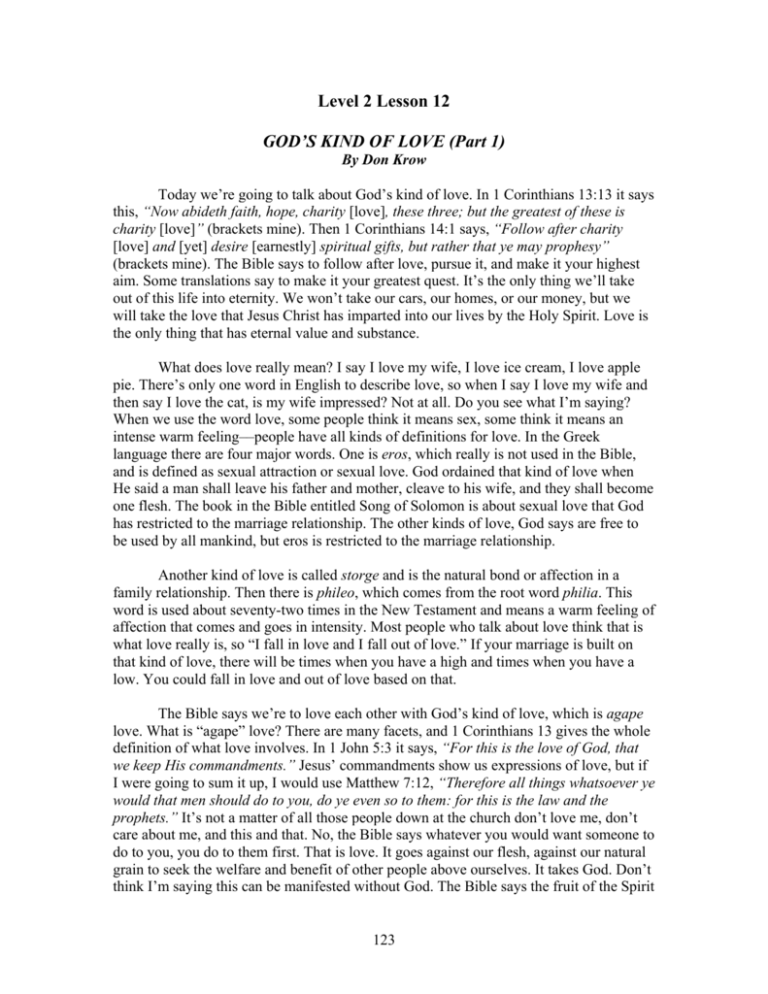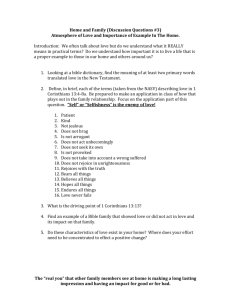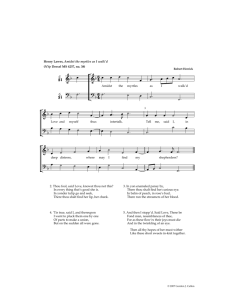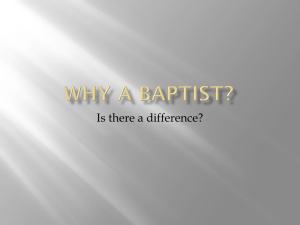GOD'S KIND OF LOVE - Discipleship Evangelism
advertisement

Level 2 Lesson 12 GOD’S KIND OF LOVE (Part 1) By Don Krow Today we’re going to talk about God’s kind of love. In 1 Corinthians 13:13 it says this, “Now abideth faith, hope, charity [love], these three; but the greatest of these is charity [love]” (brackets mine). Then 1 Corinthians 14:1 says, “Follow after charity [love] and [yet] desire [earnestly] spiritual gifts, but rather that ye may prophesy” (brackets mine). The Bible says to follow after love, pursue it, and make it your highest aim. Some translations say to make it your greatest quest. It’s the only thing we’ll take out of this life into eternity. We won’t take our cars, our homes, or our money, but we will take the love that Jesus Christ has imparted into our lives by the Holy Spirit. Love is the only thing that has eternal value and substance. What does love really mean? I say I love my wife, I love ice cream, I love apple pie. There’s only one word in English to describe love, so when I say I love my wife and then say I love the cat, is my wife impressed? Not at all. Do you see what I’m saying? When we use the word love, some people think it means sex, some think it means an intense warm feeling––people have all kinds of definitions for love. In the Greek language there are four major words. One is eros, which really is not used in the Bible, and is defined as sexual attraction or sexual love. God ordained that kind of love when He said a man shall leave his father and mother, cleave to his wife, and they shall become one flesh. The book in the Bible entitled Song of Solomon is about sexual love that God has restricted to the marriage relationship. The other kinds of love, God says are free to be used by all mankind, but eros is restricted to the marriage relationship. Another kind of love is called storge and is the natural bond or affection in a family relationship. Then there is phileo, which comes from the root word philia. This word is used about seventy-two times in the New Testament and means a warm feeling of affection that comes and goes in intensity. Most people who talk about love think that is what love really is, so “I fall in love and I fall out of love.” If your marriage is built on that kind of love, there will be times when you have a high and times when you have a low. You could fall in love and out of love based on that. The Bible says we’re to love each other with God’s kind of love, which is agape love. What is “agape” love? There are many facets, and 1 Corinthians 13 gives the whole definition of what love involves. In 1 John 5:3 it says, “For this is the love of God, that we keep His commandments.” Jesus’ commandments show us expressions of love, but if I were going to sum it up, I would use Matthew 7:12, “Therefore all things whatsoever ye would that men should do to you, do ye even so to them: for this is the law and the prophets.” It’s not a matter of all those people down at the church don’t love me, don’t care about me, and this and that. No, the Bible says whatever you would want someone to do to you, you do to them first. That is love. It goes against our flesh, against our natural grain to seek the welfare and benefit of other people above ourselves. It takes God. Don’t think I’m saying this can be manifested without God. The Bible says the fruit of the Spirit 123 is love, and God is love. He is the source of love and the one who will show us how to love through His commandments. He’s the one who will give us strength, even in light of our flesh, to make the right choices and decisions and act on the right principles. I work at Andrew Wommack Ministries, and one day a few years back I wanted to go and pray as I usually do after work. I was in a park, and I said, “God, I really want to minister to somebody.” It was a fairly warm day, and I saw a little boy and a little girl sitting on the swings. There was a swing open, so I went over and got in the swing. I turned to the little girl and said, “It’s a nice day, isn’t it?” She said “Me no speak English,” and I asked, “Where are you from?” She said she was from Romania. I knew there were Romanians in that area, and I saw these people looking at me, probably wondering why I was talking to their children. I went over and said, “I want to help you.” They said, “You would want to help us? Why would you want to help us? You don’t even know us!” I said, “Because God wants to help you.” I had been meditating on the principles of love in 1 John 3:18 where it says, “Let us not love in word, neither in tongue; but in deed and in truth.” We’re not to love with the words of our mouths only, but also with our actions. Although I usually don’t carry money around with me, that day I had a little in my pocket. I reached out, said “This is for you,” and gave them the money. Since I’d been fasting that day, I had a little bit of food with me, so I said, “And here’s some food for your family.” They were touched and said, “Who are you?” I told them, “God has made a divine appointment for us to meet today, and I am going see you again.” I went home and told my wife about the encounter with those Romanians. I took a roast out of our freezer and cooked it. The next day I bought a box full of dishes at a garage sale and went back to the park with my wife. The Romanians and their children were there, and I said, “I bring gifts to you. They’re heavy, so I’m going to get in my car, and if you’ll show me where you live, I’ll take the gifts to your home.” When we got to their little one-bedroom apartment, I took the dishes and silverware—everything matched—out of the box and began to give things to them, one at a time. As I handed it to them, tears began to roll down their faces, and the lady said, “Me going to cry! Me going to cry!” I said, “On Monday night we have a Bible study at our home, and I would like to invite you there.” They said “We want to come,” but I said, “I don’t want you to come because I gave you gifts.” They said, “No, we want to come and meet your friends.” Since they didn’t have transportation, I picked them up, took them to my home, and before long, God began to touch them. They couldn’t speak English very well, but He touched them when we prayed for them. The love of God was being manifested to them. Before long, we met another Romanian couple, and I said to the first couple, “Will you go and help me meet another Romanian couple?” They agreed and I got a call one day from them, “Mr. Don, we heard about you. We have the lonelies bad, and we want to meet you.” So I took my Romanian friends and went to meet them. I took gifts, food, and all kinds of things to them. As I did that and began to visit with them, everything was great until one of the first Romanian couple said, “You need to go to the Bible study. 124 They talk about Jesus, and it’s wonderful!” They said, “Wait a minute! We came from a communist country and don’t know if there’s a God. We don’t want this Jesus stuff.” I said “Let me be a friend,” and began to take them out on the weekends and buy them clothes, coats, and things they needed. They were very embarrassed and reluctant. “Well, don’t you need a coat?” “Well, yes I do, but…” “Then let’s get this coat for you.” I began to love them in action, but they wouldn’t come to our Bible study until I said, “There are probably some Americans there who will help you get a job.” Then they came right away. At the Bible study that night, I said something very foolish to the Lord, “Lord, you’re going to have to give me a genuine gift of tongues tonight because we can’t even communicate with each other very well.” There were some Americans at the Bible study that night who gave their testimonies. When I began to speak, the lady from the second Romanian couple began to lighten up, and I knew something was happening. After the study I said “Let me pray for you,” and as we prayed, God suddenly touched them and filled the whole atmosphere of the room with His love. Then the lady said, “You know, when the Americans were speaking, I couldn’t understand anything they were saying, but when you got up and started speaking about Jesus, His love for us, and what He did so we could have a relationship with Him, I understood every word you said! I understood it perfectly! It must be God! It must be God!” As a result, lives were changed, not just the Romanians. Let me tell you what happened then. My home began to be filled on Monday nights with international people—Romanians, Bulgarians, and people from Russia. God was changing lives, and they knew we loved them. We even had people from Africa. Though we could hardly speak to each other, one thing they knew: When we prayed, God would manifest Himself to them. They also knew that I would do anything for them and that I loved them. God changed their lives and the lives of many other people, and I want to tell you how it happened. It happened because one day in a park, I saw some people of another color, another nationality. I didn’t have any warm feeling of affection, but I knew that love was this: Whatever you would want someone to do to you, do to them. I sought their welfare and benefit regardless of the way I felt, and you know what happened? They so appreciated it that what rose up in them for me was philia love, the love that has feelings, and they began to say to me “I love you” and hug me and kiss me. What it did in me was generate that kind of feeling for them. If you want to have a love that has feelings in your life, practice agape love. Seek the welfare and benefit of others regardless of how you feel, and this will generate a love that has feelings. Discipleship Questions 1. Read 1 John 5:3. God’s love is shown through His ____________________________. 2. Read Romans 13:9-10. Explain how the commandment in these verses show love. ________________________________________________________________________ 125 3. Read Romans 12:19-21. How can we love our enemies, even when we don’t feel like it? ________________________________________________________________________ 4. Read Titus 2:4. What does this passage show us about love? ________________________________________________________________________ 5. Read 1 Corinthians 13:4-8 (Contemporary English Version). Describe the principles of love in detail. ________________________________________________________________________ 6. Read 1 John 3:18. How must we practice love? ________________________________________________________________________ Scriptures to Use with Questions 1 John 5:3 – “For this is the love of God, that we keep his commandments: and his commandments are not grievous.” Romans 13:9-10 – “[9] For this, Thou shalt not commit adultery, Thou shalt not kill, Thou shalt not steal, Thou shalt not bear false witness, Thou shalt not covet; and if there be any other commandment, it is briefly comprehended in this saying, namely, Thou shalt love thy neighbour as thyself. [10] Love worketh no ill to his neighbour: therefore love is the fulfilling of the law.” Romans 12:19-21 – “[19] Dearly beloved, avenge not yourselves, but rather give place unto wrath: for it is written, Vengeance is mine; I will repay, saith the Lord. [20] Therefore if thine enemy hunger, feed him; if he thirst, give him drink: for in so doing thou shalt heap coals of fire on his head. [21] Be not overcome of evil, but overcome evil with good.” Titus 2:4 – “That they may teach the young women to be sober, to love their husbands, to love their children.” 1 Corinthians 13:4-8 (Contemporary English Version) – “[4] Love is kind and patient, never jealous, boastful, proud, or rude. [5] Love isn’t selfish or quick tempered. It doesn’t keep a record of wrongs that others do. [6] Love rejoices in the truth, but not in evil. [7] Love is always supportive, loyal, hopeful, and trusting. [8] Love never fails!” 1 John 3:18 – “My little children, let us not love in word, neither in tongue; but in deed and in truth.” 126 Answer Key 1. Read 1 John 5:3. God’s love is shown through His commandments. 2. Read Romans 13:9-10. Explain how the commandment in these verses show love. Love works no wrong to its neighbor. Each commandment shows love by showing how we should respond to our neighbor. 3. Read Romans 12:19-21. How can we love our enemies, even when we don’t feel like it? If our enemy is hungry, we can feed them; if they are thirsty, we can give them something to drink. We can seek the welfare and benefit of others, regardless of how we feel. 4. Read Titus 2:4. What does this passage show us about love? Love can be taught. It’s not just a feeling. 5. Read 1 Corinthians 13:4-8 (Contemporary English Version). Describe the principles of love in detail. “Love is kind and patient, never jealous, boastful, proud, or rude. Love isn’t selfish or quick tempered. It doesn’t keep a record of wrongs that others do. Love rejoices in the truth, but not in evil. Love is always supportive, loyal, hopeful, and trusting. Love never fails!” 6. Read 1 John 3:18. How must we practice love? Let us not love only with our words, but also in our actions. Copyright © 2004, Don W. Krow Permission is granted to duplicate or reproduce for discipleship purposes on the condition that it is distributed free of charge. Discipleship Evangelism P.O. Box 17007 Colorado Springs, Colorado 80935-7007 U.S.A. www.delessons.org 127








